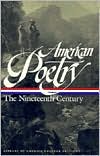

 |

|

The average rating for American Poetry: The Nineteenth Century (Library of America College Edition) based on 2 reviews is 4.5 stars.
Review # 1 was written on 2011-01-17 00:00:00 Emmanuelle Oppeneau Emmanuelle OppeneauYou want to know just how good Whitman and Dickinson are? Read their contemporaries. When you come across them after reading pages of somewhat mannered and not really inspired verse it is like looking into the sun. But of course it is unfair to compare Whitman and Dickinson's fellow poets to them when those two rank with the best that mankind has produced. These poets and poems are very enjoyable - I thought I might get 200 pages of New England puritan blather - but I was pleasantly surprised. The editing in these volumes is superb - I rarely got the sensation when reading a poet that they included far too many of their poems. Not only are attributed poems included, but anonymously written poems and folk songs as well. But my favorite was reading the American Indian selections - they can't really be termed poems because they are much more than that. |
Review # 2 was written on 2021-02-14 00:00:00 Maricar Mabanta Maricar MabantaThere are certainly a number of inspired poems in this broad sweep of 19th century American poetry besides the obvious star, Whitman (and of course Dickinson but she is in the second volume). Emerson's poems stand out despite the routine denigration they receive by critics; although his form verged on archaic while he was writing, the force of his originality and vital thought bursts from every mannered seam. William Cullen Bryant likewise proves himself a master poet, if not unfortunately of the European style, with poems like Thanatopsis and The Night Journey of the River which are technically flawless poems. One could even lend him credit as an early naturalist ' for his scenes of the New England forests are far more alive than the stale tropes of nature with which late European Romanticism was preoccupied. But still, his poems lack the transcendental impulse and cogency that American poetry gains with Emerson. A few poets reveal themselves to be utterly boring and dated, Henry Wadsworth Longfellow chief among them. I was disappointed to read Edgar Allen Poe's poems which were far less captivating than their storied counterparts. I was similarly disappointed with Thoreau who becomes, the more I read him, ever increasingly, to be the lesser part (both as Person and Writer) of the transcendental Concord duo he forms with Emerson. I was intrigued to see poems written by two U.S. Presidents: John Adams and Abraham Lincoln. They were okay ' good enough poems ' but imagine any president of the last 40 years writing a poem! Even Obama wouldn't! Adam's was clever where Lincoln's was sincere ' both fitting. I was looking forward to reading the 'mystical' sonnets of Jones Very but found them to be dull and very anxiously Christian. Much talk about the 'New Man' but unfortunately little of what He perceives . Was pleasantly surprised with beautiful, inspired poems by authors I did not know before such as Sarah Helen Whitman, Richard Henry Dana, Washington Allston, and Charles Timothy Brooks. A single poignant poem by John Greenleaf Whittier called Burning Driftwood ' a moving meditation on mortality by a dwindling fire on an abandoned beach. Brooks writes spectacularly about the sea; Allston with great credibility and sensitivity about the seasons; Dana with great compassion and feeling towards the fragile world; Sarah Helen Whitman (unrelated to Walt) with an ingenious attention to the Native American world that survives in the names of places in this country. All of these poems are SOMETHING, and certainly constitute a rich and varied heritage in themselves, but it is needless to exaggerate how completely Whitman blows them all away. The top is blown off, a poetic eruption occurs, the world is poetry in a way it has never been before. I'll echo what another reviewer says here which is: to know just how special and revolutionary both Whitman and Dickinson are (if it sadly this is not evident simply by reading them), just read their many, many contemporaries. |
CAN'T FIND WHAT YOU'RE LOOKING FOR? CLICK HERE!!!